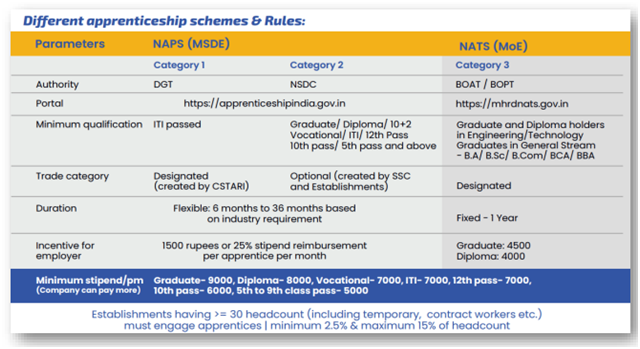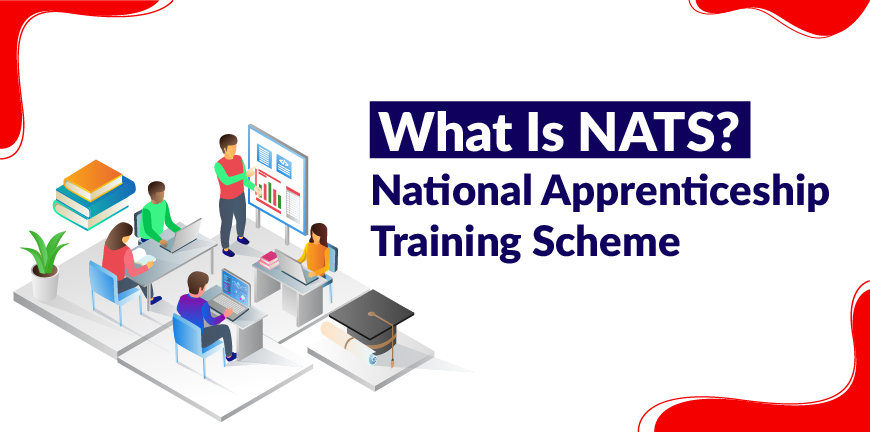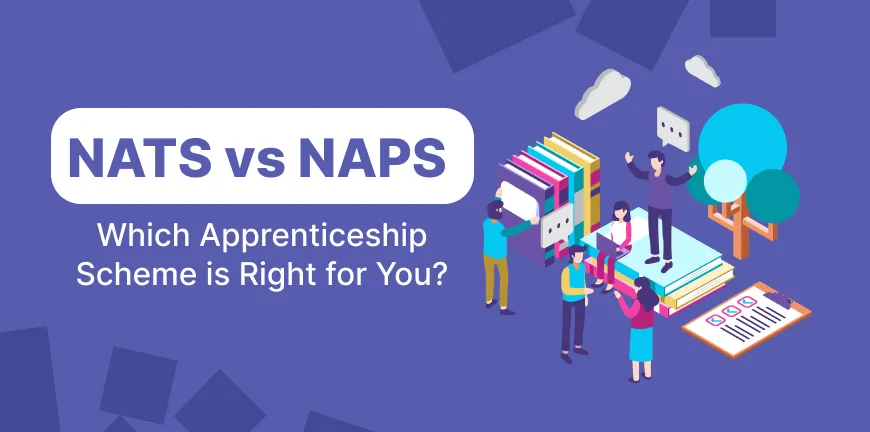
The Importance of HRMS Salary Slip For Employers and Employees
18/12/2025
7 Latest Compliance Industry Trends 2026
22/12/2025- What are NAPS and NATS?
- What Is NAPS (National Apprenticeship Promotion Scheme)?
- What Is NATS (National Apprenticeship Training Scheme)?
- Why should companies undertake the NAPS/NATS programs?
- What are the Key Differences Between NAPS and NATS?
- What are the Advantages of undertaking the NAPS/NATS Scheme?
- Why Should Employers Look at Apprenticeships?
- What Are the Benefits of Hiring Apprentices in 2026?
- What Are the Latest Trends in Apprenticeships?
- How Can Employers Benefit Financially from NAPS/NATS?
- Why Choose ALP Consulting as Your NAPS/NATS Service Provider?
- Key Takeaways
- Frequently Asked Questions
- Contact Us For Business Enquiry
“Apprenticeships create loyal, long-term contributors. NAPS and NATS turn potential into performance across every industry.”- Sanjay Malhotra, CEO, Apex Manufacturing Group.
As India’s workforce landscape undergoes rapid transformation, apprenticeship frameworks are emerging as a powerful force reshaping how businesses approach talent development. In 2026, NAPS and NATS stand at the centre of this shift, becoming increasingly relevant for organisations navigating evolving skill demands, new industry expectations, and changing workforce dynamics.
Having complete acumen of these schemes is now essential for companies seeking to stay competitive, future-ready, and aligned with national skill development priorities. Let’s dive deep & gather reasons why companies must enroll apprentices under NAPS/NATS to get the best outcomes.
What are NAPS and NATS?
National Apprenticeship Promotion Scheme (NAPS), launched by the Ministry of Skill Development and Entrepreneurship (MSDE), proactively creates and increases skilled manpower in India. The apprenticeship program comprises basic, on-the-job training at the workplace and can range from a period of 6 months to 3 years, depending on the program they take up. NAPS was introduced with a vision to provide apprenticeship training for over 50 lakh youngsters, increasing the apprentices’ engagement in the Micro, Small, and Medium Enterprises (MSME) segment to build productivity.
National Apprenticeship Training Scheme (NATS), launched by the Ministry of Human Resource Department (MHRD), is a one-year programme equipping technically qualified youth with the practical knowledge and skills required in their field of work. The main objective of NATS is to facilitate Fresh Graduates and Diploma Holders in Engineering/ Technology/ Architecture/ Pharmacy/ Hotel Management & Catering Technology, and (10+2) level Vocational courses Pass outs to acquire ‘job’ training in Industries/ Establishments and thus to make them more employable.
| Scheme | Financial Benefit to Employer | Details |
| NAPS | Reimbursement of 25% of the prescribed stipend, subject to a maximum of Rs. 1,500 per month per apprentice. | Applies when the employer pays the apprentice stipend as per prescribed rates under the Apprenticeship Rules. |
| NAPS | Reimbursement of the cost of basic training up to Rs. 7,500 per apprentice (for freshers/fresh intake requiring basic training). | Basic training cost component for apprentices without prior formal training; capped at three months/500 hours. |
| NATS | Reimbursement of 50% of the prescribed stipend, up to a maximum of Rs. 4,500 per month per apprentice. (Team Management Services) | Employer receives help with stipend payments for technically qualified apprentices under the scheme. |
| NATS | Minimum prescribed stipend (for apprentices) examples: Graduate apprentices: Rs. 9,000/month; Technician/Diploma: Rs. 8,000/month. | These are minimum prescribed stipend rates; the employer may pay more, but reimbursement is tied to specified limits. |
What Is NAPS (National Apprenticeship Promotion Scheme)?
NAPS, or the National Apprenticeship Promotion Scheme, is a government initiative that incentivizes employers to hire & engage apprentices by offering financial support for basic training & stipends. This scheme is designed to help industries develop a skilled workforce through hands-on, industry-relevant training programs. As of 2025, the number of apprentices engaged via NAPS from its inception has reached over 43.47 lakhs to date.
Here is an example:
A manufacturing company hires 40 apprentices for production and quality control through NAPS. This helps them receive reimbursement for basic training costs and stipend support, enabling the company to train fresh talent affordably while building a job-ready workforce for long-term needs.
Here are the top 5 features of the NAPS program:
- Provides financial assistance to employers for apprentice stipends, reducing training costs & improving workforce affordability.
- Supports basic training for apprentices, ensuring industry-ready skills via structured learning modules.
- Encourages MSMEs to recruit apprentices by simplifying onboarding & compliance requirements.
- Covers a wide range of job roles across different industries, promoting flexible workforce development.
- Enables easy monitoring & management through a unified digital apprenticeship portal.
What Is NATS (National Apprenticeship Training Scheme)?
NATS, or the National Apprenticeship Training Scheme, is a government-backed program that provides engineering graduates, diploma holders, & select degree students with practical, industry-based training opportunities. The scheme strengthens employability by bridging the gap between classroom learning & real-world industrial skills. As of 2025, NATS has provided apprenticeship training for over 9 Lakh candidates across India, enabling students to gain hands-on exposure and transition smoothly into the workforce.
Here is an example:
An engineering graduate joins an automobile firm through NATS for 12 months of practical training. This allows the student to gain industry-relevant technical experience while the organisation benefits from a trained trainee who supports ongoing operations and contributes to project execution.
Here are the top 5 features of the NATS program:
- Offers structured on-the-job training to graduates & diploma holders, enhancing practical technical capabilities.
- Provides government-supported stipend reimbursement directly to apprentices, simplifying financial assistance.
- Administered by the Boards of Apprenticeship Training for quality oversight & streamlined implementation.
- Builds robust industry-academia collaboration to create a pipeline of skilled and job-ready professionals.
- Enables easy registration, matching, & tracking through a dedicated national digital apprenticeship platform.
Why should companies undertake the NAPS/NATS programs?
Registered employers under the Apprentices Act of 1961 are exempt from contributing to Employees’ State Insurance (ESI) and Employees’ Provident Fund (EPF) for the apprentices engaged by them. Other than that, the Government of India provides financial support for employers undertaking the NAPS/NATS program. One of the most significant advantages is its end-to-end service for employers via third-party administrators (TPA), as the loyalty element in apprentices is higher, leading to reduced attrition.
Organizations that hire apprentices have a greater retention rate than hiring fresh candidates under contract, as candidates look forward to the Government certification they obtain at the end of the training program.
Employers can undertake either the NATS/NAPS program, depending on skill requirements/ candidate qualification/other factors based on their business needs.
To choose the right program for your business needs, take a look at the table below and understand the difference between NAPS and NATS-

Companies engaged with apprentices can also opt for ‘skill training’ from their CSR funds to demand under the Apprentices Act, and the expenses incurred during the training can be claimed as CSR expenses.
1. Cost Containment
Apart from the ease of training young people through the apprenticeship program, they cost less than candidates recruited under the minimum wage guidelines set by the government, making the entire service contract more affordable for employers and enabling them to recruit candidates at one price point, irrespective of the state.
2. Industry-focused Skills are Addressed
The apprenticeship program integrates industry and skill-based training, resulting in companies enjoying the benefits of talent that is job-ready from day one, post-training. They have the scope to produce better candidates because there is an element of soft skills attached to it, and the programs have been designed with input from the industry.
What are the Key Differences Between NAPS and NATS?
Here are the key differences between NAPS vs NATS:
| Aspect | NAPS (National Apprenticeship Promotion Scheme) | NATS (National Apprenticeship Training Scheme) |
| Target Audience | School pass-outs, ITI students, freshers, and entry-level job seekers | Engineering graduates, diploma holders, & select degree students |
| Primary Objective | Promote apprenticeship hiring by supporting employers with training & stipend reimbursement. | Provide practical on-the-job training to technically qualified students to boost employability. |
| Financial Support | Financial incentives provided to employers for basic training & stipend | Stipend support is provided directly to apprentices through government reimbursement |
| Training Focus | Basic training plus on-the-job training across diverse job roles (technical + non-technical) | Technical, discipline-specific industrial training aligned with academic qualifications |
| Administering Body | Ministry of Skill Development & Entrepreneurship (MSDE) | Ministry of Education through Boards of Apprenticeship Training (BOAT/BOPT) |
| Industry Coverage | All sectors, including manufacturing, retail, logistics, services, and MSMEs | Primarily technical and engineering-driven sectors requiring specialised skill training |
What are the Advantages of undertaking the NAPS/NATS Scheme?
- Employers are exempt from EPF and ESI contributions.
- On-the-job training creates a proactive workforce, benefiting the employers in the long run as the trainees prove to be assets to the organization
- Reduces costs on the recruitment process since the apprentices are up-skilled in a short period and start contributing productively.
- On completion of training, based on the performance of the apprentices, the employers are allowed the flexibility to retain or let go of the employees.
- CSR funds can be utilised to engage candidates in skill training under the Apprentices Act
- Skill gap shortage addressed efficiently by providing on-the-job training to candidates, specific to the business needs
- The reduced attrition rate, as there is a higher loyalty factor among apprentices
- Further provisions offered regarding the submission of returns, other information, and the contract of apprenticeship through the apprenticeship portal, for time-bound approval
- Help build brand recognition, as the primary objective of the NAPS program was to enforce apprenticeships and promote employment opportunities for the youth.
Why Should Employers Look at Apprenticeships?
1. Tailored training provided, as per business needs
The content of the apprenticeship training is set by the employer, who decides which skills their ideal employee needs. Suppose a new graduate lacks technical skills, and you have a vacancy to fill, engaging in an apprenticeship is a good option.
2. One way to upskill current employees
A maximum number of apprentices are usually above the age of 19 and are likely to have been in apprenticeships with their current employer.
How can this help? In your current workforce, there may be an employee who can benefit from an MBA to fast-track his managerial skills, or maybe one of your employees is exceptionally talented but lacks technical skills, and can be upskilled by an apprenticeship, instead of formal educational training.
3. Apprenticeship costs are taken care of
Under the NAPS scheme, the government provides employers with financial assistance. Apprenticeship with a basic training amount of up to Rs 7500 per apprentice for a maximum of 500 hours is reimbursed by the Government of India.
Under the NATS scheme, apprentices connected with the technical field are liable to earn around Rs. 8000 per month, while the graduates would be earning Rs. 9000 per month during their training year.
4. Soft skill shortages addressed
Graduates are often technically sound but lack the skills to work in a daily work environment. Skills like negotiation, up management, business communication, and commercial awareness are essential to keep up in a traditional workplace. Apprentices develop these skills as they work and learn simultaneously in a working environment.
5. Can free up senior staff
Low-level tasks are a part of daily work in a business environment, but are also something that has to be taken care of. An apprentice can handle these tasks and free up the senior staff, allowing them to focus on more critical business operations.
6. To get a fresh perspective from the younger generation
Employers are aware of the value of diversity in the workplace and the many benefits it offers to better the productivity of an organization. At times, apprentices can offer a fresh perspective and insight into clientele behaviour, especially if the client is from the youngster generation.
It is evident that the NAPS/NATS program is beneficial for the future of Indian industrial sectors and can help boost the economic growth of our Country.
What Are the Benefits of Hiring Apprentices in 2026?
Here are 5 key benefits of hiring apprentices in 2026
1. Build a Future-Ready Workforce
Hiring apprentices helps companies of all types build a steady pipeline of skilled, job-ready talent trained specifically for business needs, ensuring long-term workforce sustainability & reduced hiring risks.
2. Reduce Recruitment and Training Costs
Apprenticeships lower hiring expenses by enabling companies to train talent in-house, minimise onboarding costs, & avoid expensive external hiring cycles for entry-level roles.
3. Improve Productivity and Operational Efficiency
Well-trained apprentices contribute quickly to daily operations, support project execution, & help reduce workload pressures on full-time staff, boosting overall business productivity.
4. Strengthen Employer Branding and Talent Attraction
Organisations offering apprenticeships are seen as growth-focused employers who invest in skill development, boosting brand perception, & attracting quality talent across industries.
5. Enhance Compliance and Access to Government Incentives
Through NAPS/NATS, companies receive financial support, simplified processes, & compliance benefits, helping them adopt structured workforce development models aligned with national skill-building priorities.
What Are the Latest Trends in Apprenticeships?
Here are the 5 latest trends of Apprenticeship Training in India:
1. Digital and Tech-Integrated Training
Companies are adopting digital tools, simulation-based learning, & AI-enabled platforms to provide more efficient, faster, & real-time apprenticeship training experiences.
2. Rise of Apprenticeships in Emerging Sectors
Industries like EV, AI, robotics, renewable energy, logistics, & healthcare are increasingly adopting apprenticeships (both NAPS & NATS) to fill specialised skill gaps.
3. Shift Toward Longer-Term Skill Pathways
Apprenticeships are evolving from short-term training models to structured career pathways, enabling learners to progress into full-time roles with deeper multi-skill development.
4. MSMEs and Startups Increasing Participation
Smaller companies & startups are adopting apprenticeships to minimise costs, access young talent, & strengthen operations without heavy hiring overheads.
5. Stronger Integration of Academia and Industry
Educational institutions & companies are collaborating more closely to design customised apprenticeship programs aligned with real industry needs.
How Can Employers Benefit Financially from NAPS/NATS?
Here are 5 ways employers can leverage NAPS/NATS financially:
1. Stipend Reimbursement Support
Employers receive reimbursement for apprentice stipends under NAPS & NATS, reducing overall payroll expenses & making entry-level workforce hiring more cost-effective.
2. Lower Training Costs with Government Assistance
NAPS/NATS covers a portion of basic training expenses, enabling companies to train fresh talent without large investments in training infrastructure or faculty.
3. Reduced Recruitment and Attrition Costs
Apprenticeship programs under NAPS/NATS create a steady talent pipeline, cutting external hiring costs & reducing attrition by nurturing homegrown talent prepared for long-term roles.
4. Higher Productivity at Lower Cost
Apprentices contribute to daily tasks while costing less than full-time employees, offering a high productivity-to-cost ratio for operational functions.
5. Long-Term ROI Through Skill Alignment
By training apprentices precisely for business requirements, companies gain talent with the right skills from day one, improving long-term productivity & reducing skill mismatch losses.
Why Choose ALP Consulting as Your NAPS/NATS Service Provider?
As an authorized Third-Party Aggregator (TPA) for both NATS and NAPS, Alp facilitates employers with the submission of reimbursement claims, apprenticeship contracts, and various other formalities to be adhered to under the apprenticeship program.
Alp Consulting has always encouraged employers to get eminently involved in mobilizing employment in India.
In the journey of contributing towards government schemes, our clients have benefited and have been equipped with a potential workforce to suit the exact requirements of their organizations. Alp Consulting also gives access to a large pool of talent and future workforce, along with consistent assistance through each step of implementation of the National Apprenticeship Programme Scheme.
Key Takeaways
- Apprenticeships strengthen India’s evolving workforce by aligning industry needs with practical, job-ready skills.
- NAPS and NATS offer structured apprenticeship pathways tailored to technical & non-technical talent requirements.
- Employers gain financial support through stipend reimbursements and reduced training, recruitment, and compliance costs.
- Apprenticeships lower attrition, improve productivity, & create a reliable long-term talent pipeline.
- ALP Consulting simplifies NAPS/NATS implementation with end-to-end support & seamless compliance management.
Frequently Asked Questions
1. What is the difference between NAPS and NATS?
NAPS supports employers with stipends and basic training for apprentices, whereas NATS offers structured technical training for graduates and diploma holders.
2. Who can apply for NAPS or NATS?
NAPS is open to school pass-outs and freshers, while NATS is for engineering graduates & diploma holders seeking industry training opportunities.
3. Do companies get financial benefits for hiring apprentices?
Yes, companies receive stipend reimbursement, reduced training costs, & simplified compliance support through government-backed apprenticeship schemes like NAPS and NATS.
4. How can ALP Consulting help with NAPS/NATS?
ALP Consulting manages end-to-end apprenticeship hiring, compliance, documentation, onboarding, & scheme implementation (NAPS/NATS), ensuring smooth execution & maximum financial benefits.
5. Are apprentices covered under PF/ESI?
Apprentices under the Apprentices Act are generally exempt from PF & ESI, but company-sponsored trainees may require statutory contributions.
Contact Us For Business Enquiry

Suresh Ramkrishna
Suresh Ramkrishna is the Operations Manager at Alp Consulting Ltd., with over 30 years of extensive experience spanning recruitment operations, sourcing, supply chain management, and client relations. At Alp, he leads the Search & Staffing Practice, specializing in bilingual and niche skill hiring while overseeing Japanese language and TITP (Technical Intern Training Program) initiatives. He also manages NAPS (National Apprenticeship Promotion Scheme) training programs, fostering skill development and workforce readiness across industries. Previously, he spent over two decades in the apparel export industry, managing vendor development and international sourcing for top global brands. Suresh’s leadership blends strategic talent acquisition with operational excellence across diverse industries.




